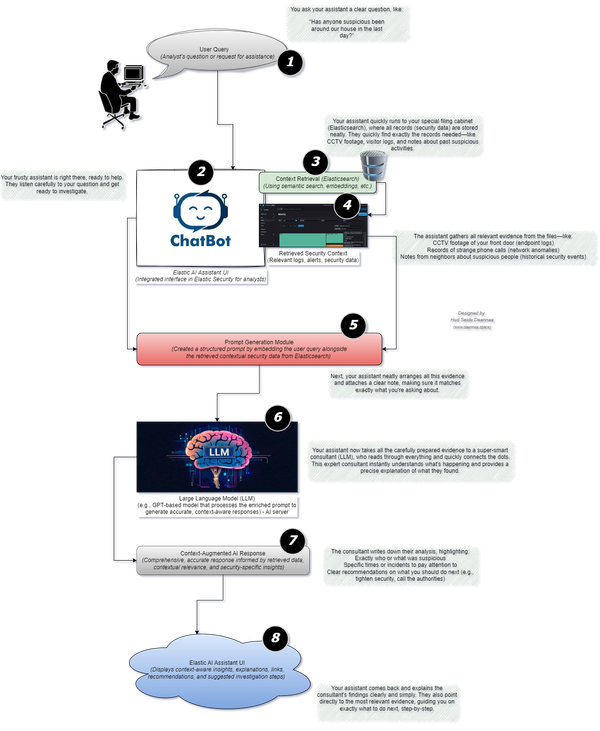The Role of Privacy Search Engines in Hacking and Investigations, and Why They Still Matter in the Age of AI Chatbots
In the AI age, privacy matters more than ever. While AI search engines profile users, privacy-focused engines like RabitaNoor Search protect your data, ensuring confidential, trace-free browsing. For secure searches without tracking, explore RabitaNoor Search your privacy, guaranteed.

In the rapidly evolving landscape of cybersecurity and digital privacy, search engines have become indispensable tools. Whether it's a hacker trying to find vulnerabilities or a cybersecurity professional conducting investigations, search engines play a crucial role in accessing information quickly and efficiently. However, as technology advances, particularly with the rise of AI-powered search engines and chatbots, the importance of privacy-oriented search engines cannot be overstated.
The Use of Privacy Search Engines in Hacking and Investigations
Privacy search engines, such as DuckDuckGo, Startpage, and others, have become popular among both hackers and investigators for their commitment to user anonymity. These search engines do not track user activity, store personal data, or create profiles based on search queries. For hackers, this anonymity is invaluable. It allows them to research vulnerabilities, explore hacking techniques, and gather intelligence without leaving a digital footprint that could be traced back to them[1].
On the other hand, cybersecurity professionals and investigators leverage privacy search engines to conduct sensitive research. When investigating cyber threats or criminal activities, the last thing they want is for their queries to be logged and potentially exposed. Privacy search engines offer a layer of protection, ensuring that their investigative activities remain confidential. This is particularly crucial when dealing with advanced persistent threats (APTs) or nation-state actors, where even the smallest leak of information could jeopardize an investigation[1].
The AI Revolution in Search Engines: A Double-Edged Sword
The advent of AI-powered search engines and chatbots, such as OpenAI's ChatGPT or Google's Bard, is poised to revolutionize the way we interact with information online. These AI chatbots are designed to provide more accurate and contextually relevant responses to user queries, often anticipating what the user is looking for even before they complete their search[3]. This level of personalization, while impressive, comes at a cost.
AI search engines typically rely on vast amounts of data to function effectively. They collect and analyze user behavior, search histories, and other personal data to refine their algorithms and improve the accuracy of their responses. While this data-driven approach enhances the user experience, it also raises significant privacy concerns. Every query you make, every link you click, and every piece of information you interact with could be stored, analyzed, and used to build a detailed profile of you as a user[4].
Why Traditional Privacy Search Engines Still Matter
In an era where data is often described as the new oil, the importance of privacy cannot be overstated. Traditional privacy search engines will continue to play a vital role, even as AI chatbots become more prevalent. One of the primary reasons for this is that privacy search engines do not store user data or create profiles based on user behavior. This fundamental difference means that users can search for information without fear of being tracked, profiled, or targeted with ads[4].
Moreover, privacy search engines offer a level of control that AI-powered search engines cannot match. Users who prioritize their privacy can choose to use these engines for sensitive searches, confident that their data will not be harvested or exploited. This is particularly important for individuals who are concerned about the growing influence of AI and the potential for misuse of personal data[4].
The Future of Search Engines: Balancing AI and Privacy
As AI chatbots continue to evolve and become more integrated into our daily lives, the challenge will be to balance the convenience and efficiency of AI with the need for privacy and security. Privacy search engines will remain a crucial tool for those who value their anonymity and wish to avoid the pervasive data collection practices that have become the norm in the digital age[4].
In conclusion, while AI-powered search engines and chatbots may offer unprecedented levels of personalization and efficiency, traditional privacy search engines will continue to matter. They provide a safe haven for users who wish to conduct searches without being tracked or profiled, ensuring that privacy remains a fundamental right in the digital world.
Introducing RabitaNoor Search: Your Gateway to Private and Secure Searches
As the digital landscape continues to evolve, the need for privacy-first search engines has never been more critical. That's why we are proud to introduce RabitaNoor Search, our cutting-edge privacy search engine designed to offer you the utmost security and anonymity.
RabitaNoor Search is built on the principle that your data belongs to you. We do not track your searches, store personal information, or build user profiles. Whether you are conducting sensitive research, investigating cyber threats, or simply want to browse the web without leaving a trace, RabitaNoor Search ensures your activities remain private.
But privacy doesn’t mean compromising on performance. RabitaNoor Search delivers fast, accurate, and reliable search results, powered by advanced algorithms that prioritize your needs without sacrificing your privacy. In an era dominated by AI chatbots and data-driven technologies, RabitaNoor Search stands out as a beacon for those who value their digital sovereignty.
Explore RabitaNoor Search today, and take control of your online privacy. Your search, your privacy guaranteed.

References:
[1] https://www.forbes.com/sites/forbesbusinesscouncil/2024/06/17/navigating-security-challenges-in-the-age-of-ai-chatbots/
[2] https://www.mdpi.com/2071-1050/15/16/12451
[3] https://cdn.openai.com/papers/gpt-4.pdf
[4] https://www.technologyreview.com/2022/03/29/1048439/chatbots-replace-search-engine-terrible-idea/
[5] https://www.sciencedirect.com/science/article/pii/S0268401223000233
[6] https://www.researchgate.net/publication/352141675_Chatbots_Security_privacy_data_protection_and_social_aspects
[7] https://ec.europa.eu/futurium/en/system/files/ged/consultation_feedback_on_draft_ai_ethics_guidelines_9.pdf
[8] https://www.researchgate.net/publication/369469747_Do_ChatGPT_and_Other_AI_Chatbots_Pose_a_Cybersecurity_Risk_An_Exploratory_Study






